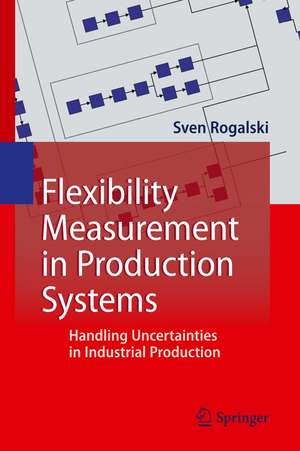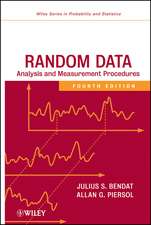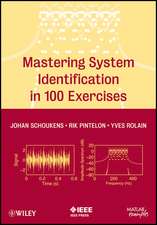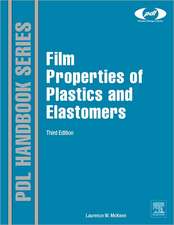Flexibility Measurement in Production Systems: Handling Uncertainties in Industrial Production
Autor Sven Rogalskien Limba Engleză Paperback – 28 noi 2014
With this as a background, this book explores the current developments and trends as well as their impact on today’s production systems. It also compares known strategies, concepts and methods used to achieve production flexibility. Similarly, the practical knowledge and current research will be drawn upon and subjected to a sound scientific analysis, through which the technical and organizational flexibility ranges can be measured in their application in a production system. The convenience and usefulness of this concept for manufacturers is substantiated by its implementation in a software tool called ecoFLEX and its practical application, based on extensive examples. This illustrates how flexibility flaws can be quickly identified, classified and properly disposed of using ecoFLEX. This tool helps to close the gap between ERP / PPS systems and digital factory planning tools.
| Toate formatele și edițiile | Preț | Express |
|---|---|---|
| Paperback (1) | 382.57 lei 6-8 săpt. | |
| Springer Berlin, Heidelberg – 28 noi 2014 | 382.57 lei 6-8 săpt. | |
| Hardback (1) | 389.88 lei 6-8 săpt. | |
| Springer Berlin, Heidelberg – 14 mai 2011 | 389.88 lei 6-8 săpt. |
Preț: 382.57 lei
Nou
Puncte Express: 574
Preț estimativ în valută:
73.23€ • 79.57$ • 61.55£
73.23€ • 79.57$ • 61.55£
Carte tipărită la comandă
Livrare economică 21 aprilie-05 mai
Preluare comenzi: 021 569.72.76
Specificații
ISBN-13: 9783642441462
ISBN-10: 3642441467
Pagini: 200
Ilustrații: XI, 186 p.
Dimensiuni: 155 x 235 x 11 mm
Greutate: 0.29 kg
Ediția:2011
Editura: Springer Berlin, Heidelberg
Colecția Springer
Locul publicării:Berlin, Heidelberg, Germany
ISBN-10: 3642441467
Pagini: 200
Ilustrații: XI, 186 p.
Dimensiuni: 155 x 235 x 11 mm
Greutate: 0.29 kg
Ediția:2011
Editura: Springer Berlin, Heidelberg
Colecția Springer
Locul publicării:Berlin, Heidelberg, Germany
Public țintă
Professional/practitionerCuprins
Introduction.- Analysis of the field of observation.- Introduction of a new Evaluation Methodology .- Practical Experience in the new Methodology.- Summary and Outlook.- References.- Appendix A Basic Knowledge.- Appendix B Additional Methods for Calculating of Flexibility.- Appendix C Demonstration of Further Aspects Regarding the Evaluation Methodology.- Appendix D Example of a Production System (for Illustrating Flexibility Calculations).- Appendix E Calculation Parameters of the Expansion Activities from the Example Production System.
Notă biografică
After a 3.5-year technical vocational training followed by 4 years of self-employment in the computer education field, Sven Rogalski studied commercial information technology (Wirtschaftsinformatik) at Otto-von-Guericke University in Magdeburg, Germany. In January 2006 he started working as a scientific researcher in the department Process and Data Management in Engineering (PDE) at FZI Forschungszentrum Informatik in Karlsruhe, Germany. Since then, he has worked in various industrial research projects. In March 2009 Sven Rogalski was appointed head of PDE department. Two months later, at the University of Karlsruhe, he successfully finished his PhD by evaluating production systems. In the same year he took over research field “Production and Logistics” at FZI.
Textul de pe ultima copertă
The requirements for production systems are constantly changing as a result of changing competitive conditions. This poses a challenge for manufacturers in the various branches of industry and creates an ever-increasing need for flexibility.
With this as a background, this book explores the current developments and trends as well as their impact on today’s production systems. It also compares known strategies, concepts and methods used to achieve production flexibility. Similarly, the practical knowledge and current research will be drawn upon and subjected to a sound scientific analysis, through which the technical and organizational flexibility ranges can be measured in their application in a production system. The convenience and usefulness of this concept for manufacturers is substantiated by its implementation in a software tool called ecoFLEX and its practical application, based on extensive examples. This illustrates how flexibility flaws can be quickly identified, classified and properly disposed of using ecoFLEX. This tool helps to close the gap between ERP / PPS systems and digital factory planning tools.
With this as a background, this book explores the current developments and trends as well as their impact on today’s production systems. It also compares known strategies, concepts and methods used to achieve production flexibility. Similarly, the practical knowledge and current research will be drawn upon and subjected to a sound scientific analysis, through which the technical and organizational flexibility ranges can be measured in their application in a production system. The convenience and usefulness of this concept for manufacturers is substantiated by its implementation in a software tool called ecoFLEX and its practical application, based on extensive examples. This illustrates how flexibility flaws can be quickly identified, classified and properly disposed of using ecoFLEX. This tool helps to close the gap between ERP / PPS systems and digital factory planning tools.
Caracteristici
A guide for the application of methods to evaluate the flexibility of production systems It describes the development of a novel evaluation methodology and it shows its detailed practical application It is interesting for industrial practice, but also to university research and teaching Includes supplementary material: sn.pub/extras










